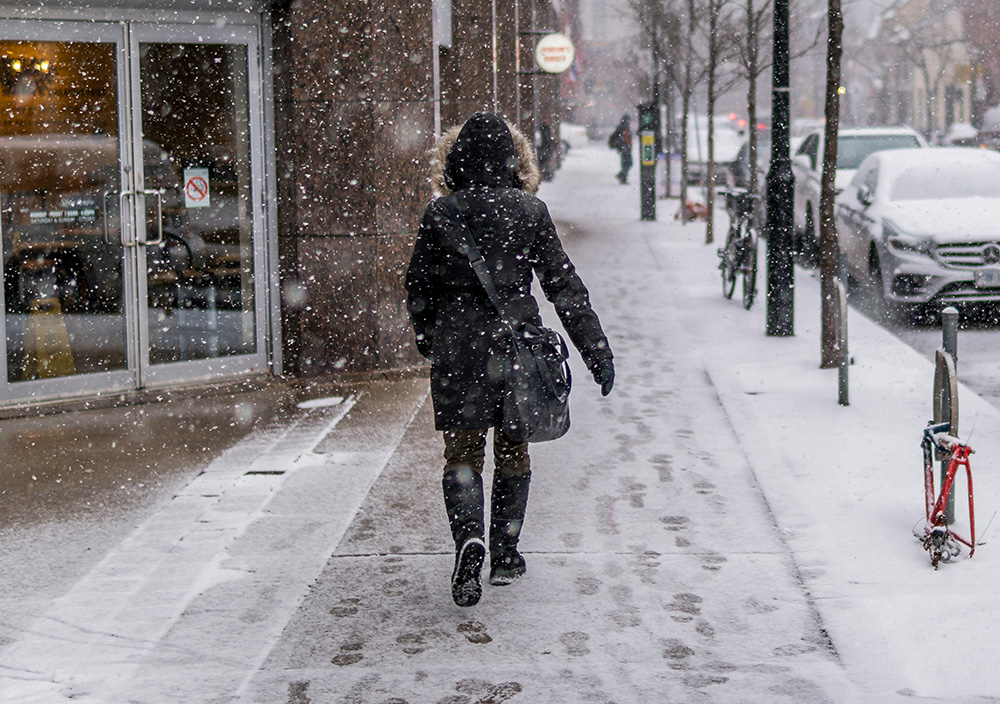
Most of us have had the unpleasant experience of taking a tumble during the winter. Snow and ice create more slippery surfaces, making it more likely that you’ll lose your footing.
Slipping and falling is so common in wintertime that people may consider it a normal part of the season. Yet these incidents can also lead to serious injuries, such as broken bones or traumatic brain injuries, that result in lost wages and expensive medical bills.
Even though falls occur frequently in the winter, you’ll still have grounds for a personal injury claim if another person’s negligence contributed to your accident. However, numerous factors also go into determining liability in a winter slip and fall case, including the property owner’s responsibilities, the injured person’s actions, and the inherent risks of winter weather.
When you have grounds for a personal injury claim
The property owner failed to remove ice and snow
Property owners have a duty of care to keep the premises reasonably safe for visitors. During the winter, that means inspecting areas such as walkways, driveways, and parking lots for snow and ice, and then taking steps to remove it. Although public sidewalks are considered municipal property, local ordinances and statutes typically put the responsibility for snow and ice removal on the abutting property owner. Commercial property owners also have a duty to anticipate inclement weather and prepare accordingly, in addition to maintaining the property after a weather event.
The property owner negligently maintained their property
If a property owner does not maintain their property well, it can lead to hazards such as leaking roofs, improperly draining gutters, or poor drainage. These conditions can cause water to pool and freeze in areas where visitors might walk, increasing the risk of a slip and fall accident. Property owners can also directly create hazards through negligent behavior, such as emptying water onto a nearby sidewalk and allowing it to freeze.
The property owner failed to warn you about the hazard
A property owner can — and should — put up signs or barriers warning people about slippery conditions they know to exist. If the property owner does not take this step, they can be held liable if someone is injured on the property.
When you might not have a claim
The property owner wasn’t negligent
Property owners are not expected to remove every last speck of snow and ice from their property, only to make a reasonable effort to address the hazard. A court may determine that the property owner did their due diligence but that inherently dangerous conditions still remained.
Similarly, property owners are not expected to clear snow and ice as soon as it appears; rather they must address the hazard within a reasonable amount of time. If you slipped and fell while walking during a winter storm, for example, a property owner can’t be held liable because they aren’t expected to clear their property until after this weather has subsided (this is known as the “ongoing storm doctrine”).
Property owners can also sometimes limit, or even eliminate, their liability if they demonstrate that they quickly addressed a hazard once it was reported to them.
You share the blame for your injury
Comparative negligence is an affirmative defense that typically acknowledges that the defendant bears some responsibility for the plaintiff’s injuries, but also argues that the plaintiff is partially to blame due to their own negligent actions. For example, the defendant in a winter slip and fall case might argue that the plaintiff was wearing improper footwear or failed to see the hazard because they were distracted at the time.
If the court determines that you were primarily responsible for your injury (at least 51 percent to blame), you won’t be able to recover damages. If the defendant was primarily to blame, you’ll still be able to file a claim but comparative negligence will reduce the damages you’ll be able to recover.
You slipped and fell on public property
Government entities generally have greater protection against lawsuits. This will limit your ability to file a claim if you slipped and fell at a location such as a government building, public park, or a sidewalk maintained by a municipality.
However, it is still possible to file a claim against a government entity if you follow certain procedures and abide by timelines, and if you can make the case that the government was negligent in its duty of care.
Let’s review your case
If you have been injured in a winter slip and fall accident, the experienced attorneys at Anderson Trial Lawyers can help you with your personal injury claim. Contact us online or call us at 860.886.8845.